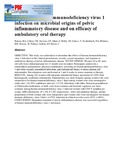| dc.contributor.author | Bukusi, EA | |
| dc.contributor.author | Cohen, CR | |
| dc.contributor.author | Stevens, CE | |
| dc.contributor.author | Sinei, S | |
| dc.contributor.author | Reilly, M | |
| dc.contributor.author | Grieco, V | |
| dc.contributor.author | Eschenbach, DA | |
| dc.contributor.author | Holmes, KK | |
| dc.contributor.author | Bwayo, JJ | |
| dc.contributor.author | Ndinya-Achola Jeckoniah O. | |
| dc.contributor.author | Kreiss, J | |
| dc.date.accessioned | 2013-04-26T08:11:27Z | |
| dc.date.available | 2013-04-26T08:11:27Z | |
| dc.date.issued | 1999 | |
| dc.identifier.citation | Am J Obstet Gynecol. 1999 Dec;181(6):1374-81 | en |
| dc.identifier.uri | http://www.ncbi.nlm.nih.gov/pubmed/10601915 | |
| dc.identifier.uri | http://erepository.uonbi.ac.ke:8080/xmlui/handle/123456789/16958 | |
| dc.description.abstract | OBJECTIVE:
This study was undertaken to determine the effects of human immunodeficiency virus 1 infection on the clinical presentation, severity, causal organisms, and response to ambulatory therapy of pelvic inflammatory disease.
STUDY DESIGN:
Women 18 to 40 years old with lower abdominal pain for <1 month were recruited. Participants underwent a standardized questionnaire, physical examination, screening for human immunodeficiency virus 1 and other sexually transmitted infections, and endometrial biopsy to detect plasma cell endometritis. Reevaluations were performed at 1 and 4 weeks to assess response to therapy.
RESULTS:
Among 162 women with adequate endometrial biopsy specimens 63 (39%) had histologically confirmed endometritis. Endometritis was more frequent among women who were seropositive for human immunodeficiency virus 1 than among women who were seronegative (odds ratio, 3.0; 95% confidence interval, 1.5-5.9). Infections with either Neisseria gonorrhoeae or Chlamydia trachomatis, or both, were least common and bacterial vaginosis was most common among human immunodeficiency virus 1-infected women with CD4 T-lymphocyte counts <400 cells/microL (P <. 04, P <.03, respectively). After oral antibiotic therapy, similar proportions of both women who were seropositive and women who were seronegative for human immuno-deficiency virus 1 had a >/=75% reduction in clinical severity score (81% vs 86%).
CONCLUSION:
Outpatient treatment of pelvic inflammatory disease was successful regardless of human immunodeficiency virus 1 serostatus. | en |
| dc.language.iso | en | en |
| dc.title | Effects of human immunodeficiency virus 1 infection on microbial origins of pelvic inflammatory disease and on efficacy of ambulatory oral therapy | en |
| dc.type | Article | en |
| local.publisher | Center for Microbiology Research, Kenya Medical Research Institute, | en |
| local.publisher | Department of Medical Microbiology, University of Nairobi | en |

